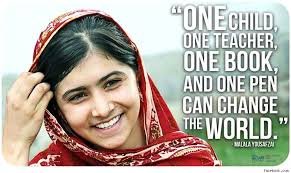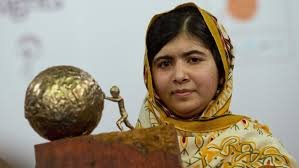Malala Yousafzai: The Aftermath
Most everyone knows who Malala Yousafzai is. Many people know her as the girl who was shot in the head by the Taliban when she was only fifteen. After that, most people don’t know what happened to her. Well, she has been busy doing more and more to further her fight to girls’ education.
On October 9, 2012, as Malala was on her way home from school, a gunman boarded her bus, asked for her by name, and fired three shots. Two of the shots hit other girls who were not critically injured and the third hit Malala. It hit the left side of her face, traveled the length of her forehead under her skin and ended up in her left shoulder. For a long time, she in a coma and in very critical condition. She miraculously survived and continued her fight for women’s education around the world.
Since the attack, Malala has been busy. Even while she was recovering in the hospital, her cause became more and more popular. The entire world was outraged- except her home country. Some Pakistanis claimed it was a hoax or a plot by the Americans to have an excuse to continue drone strikes, but many Pakistanis were outraged for this act of violence against a child. There was a global outcry for support of Malala and her cause. Madonna dedicated her song “Human Nature” to Yousafzai at a Los Angeles concert October 9, 2012. Former First Lady Laura Bush compared Yousafzai to Anne Frank, Angelina Jolie wrote an article about her kids’ reactions, and she later donated $200,000 to the Malala Fund (I am Malala).
Malala and her father set up an organization called Malala’s Fund. This organization raises money and awareness for girls’ education around the world. “We amplify the voices of the girls to keep them in the spotlight. We advocate at the international, national, and local level for policy and system changes that give girls access to a high quality education at a community level. We invest in community centered scalable solutions that provide quality education with potential for systems level change by empowering local leaders and educators.” (Malala Fund).
Malala has received many awards for her bravery. She earned a spot as one of
Times magazine’s Most Influential People in 2013 and she won the 2013 Heroic Woman of the Year. On her 16th birthday, she spoke at the United Nations to persuade politicians to take action to ensure every child has the opportunity to go to school. She received many other awards as well (Fanatics Fear Education, Malala Says).
Malala earned a nomination for the Nobel Peace Prize in 2013, but did not win. She received a nomination again in 2014. She and another Indian children’s activist won the award together. Malala dedicated the award to the young girls and women who still struggle for education (Malala Yousafzai).
Malala and her family currently reside in Birmingham, England. From there, she received her life-saving treatment at Queen Elizabeth Hospital. She is still a very active voice against oppression of women, and is still considered a target by the Taliban. She attends school in Birmingham,
which is where she happened to be when she received the Nobel Peace Prize
(Malala Fund).
Malala is using her reward money to run an orphanage in which those orphans are receiving a quality education. She also donated a large amount of money towards making a quality education system in Pakistan that will “ensure a bright future for our youth”. She is doing everything she can to serve humanity without any discrimination and by doing so, she has created a better image for Pakistanis around the world (Malala's Future Plans).
When Yousafzai did not win the Nobel Peace Prize in 2013, she was quoted saying she hopes to be Pakistan’s Prime Minister. In an interview with American news network CNN, she said it was her hope to one day become Pakistani prime minister. She had once hoped to become a doctor, but felt she could be a bigger help in politics.
Malala has had enormous support from her family, especially her father. Ziauddin Yousafzai was a founder of a girls’ school in Pakistan. He has never given up on Malala, even when everyone was telling him to prepare a funeral. He was her inspiration to be so vocal about her beliefs and he taught her how to be vocal, but to be smart at the same time. She also has a huge amount of support from her mother, even though Tor Pekai is terrified for her daughter’s life. She and Zaiuddin have always stood behind Malala and have shaped her into the amazing activist she is today (Vernalls).
Malala is an amazing young woman and an inspiration to young girls all around the world. She has shown everyone that it is OK to stand up for what you believe in. She has also shown everyone to never give up, no matter what obstacles you face. Finally, a quote from her speech at Harvard: “When the whole world is silent, even one voice becomes powerful.” Malala Yousafzai.
 The Differences in Cultures
The Differences in Cultures


 ElizabethMarieVF232210
ElizabethMarieVF232210